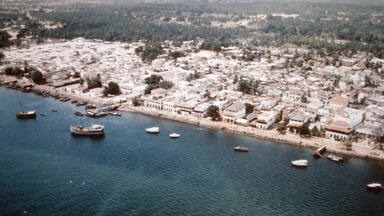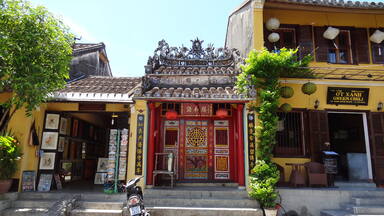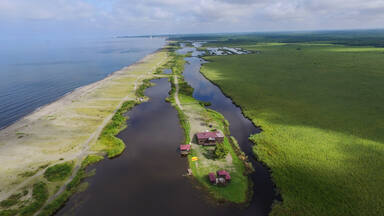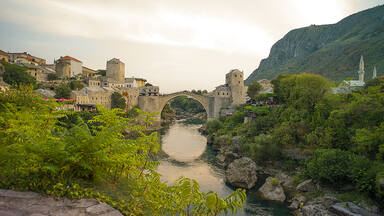Tourism constitutes one of Indonesia's priority government investment areas to boost national GDP. A programme of tourism capacity development for homestay owners and young tour guides in three neighbouring locations in Central Java and Yogyakarta Indonesia has been focusing on local communities.
Indonesia's two major World Heritage sites – Borobudur and Prambanan, combined with Yogyakarta heritage city were identified as some of the most popular tourist destinations in Indonesia. Following in-depth consultations, the UNESCO Jakarta office, in collaboration with GIZ and other local implementation partners identified that with the right level of knowledge and skills, two specific groups, (namely, new and future homestay owners in Borobudur sub-districts and young tour guides from Borobudur-Yogyakarta-Prambanan) could help to seed sustainable tourism practices in their respective destinations long into the future.
© Perkumpulan Inovasi Tangguh Indonesia/UNESCO Jakarta
In September 2022 a kick-off workshop saw 50 homestay owners make a learning visit to an eco-friendly bungalow namely Yabbiekayu in Tembi village, Yogyakarta. Following this, participants learnt about the eco-friendly principles and practices in eco-friendly homestay construction and management which will help participants to develop their own respective businesses in the future.
Surveys conducted between March and May 2022 revealed that the local communities were lacking business and technical skills in areas such as online marketing, hospitality, local & traditional packaging, complaint handling, consumer protection and risk management. Therefore, ongoing weekly workshops during October and November 2022 have helped them to develop a range of skills, reflecting the fact that embedding sustainable practices within a family run accommodation business shouldn’t be done in isolation to other topics but instead should go hand in hand with improving business administration, marketing, branding, storytelling and product development.
Thanks to the training, participants have been given the skills to run a more economically sustainable tourism business, and are therefore in a stronger position to deliver further positive benefits to the local community in the longer-term. The importance of homestays is critical too, since they typically offer visitors a much more authentic experience, reflecting and respecting local traditions – while receiving income which helps to directly support the hosts and their wider families.
Beyond the direct project beneficiaries, the project has also engaged 17 students of the College of Vocational Studies, IPB University (SV – IPB) – Ecotourism Department during September – November 2022. Twelve students were deployed to six villages in Borobudur for two months and worked with the local communities in each village to identify their local potentials including the local crafts, culinary or art performance. They consulted communities and prepared mini events with the locals such as craft workshop, story-telling training, etc. UNESCO and its partners acted as a mentor and coached these students on the subjects of community empowerment and how to adopt community-based approaches.
The remaining five students were deployed to assist the implementation of 25 thematic coaching sessions with the homestay owners. They assisted with training implementation and also assisted the participants throughout the process. This program is part of the Merdeka Belajar Kampus Merdeka (MBKM) or “ Study Independently in Independent Campus“. MBKM is a compulsory program that was launched by the Ministry of Education, Culture and Research of Indonesia during 2021 which encourages students to study outside their campus, and learn from practical experience. These 17 students were also introduced to the Atingi online courses and accessed the modules to improve their knowledge about sustainable tourism. By the end of the weekly sessions, a closing ceremony was organized where 42 homestay owners received a package of branding visual identity to enhance their marketing and promotion. A study tour to Bali was also organized in mid-December for selected participants to further gain experience in community based tourism and eco-friendly business practices in Bali.
© Perkumpulan Inovasi Tangguh Indonesia/UNESCO Jakarta
Furthermore, to support local food systems in the homestay based on sustainable tourism principles, starting in September 2022 a collaboration was made with PT Panah Merah, an Indonesian company working in vegetable seeds production. Panah Merah through its foundation Yayasan Bina Tani Sejahtera (YBTS) created and funded three pilot vegetable demonstration plots. In three different locations, homestay owners were invited to manage the plots and learn good agricultural practices. They used the SIPINDO app (Indonesia’s Agriculture Information system) to learn more about practical agricultural work such as seedling, water management, using climate information, and vegetable marketing networks. The collaboration resulted in the harvesting of vegetables (lettuce, water spinach, green beans, mustard greens, etc) which were then used to support homestay culinary businesses as well on November 2022.
Local implementation partner: Local government authorities, Perkumpulan Inovasi Tangguh Indonesia, Via Via Travel, Locomotion Art Studio, Ecotourism Study Program of College of Vocational Studies-IPB University, coordinated by UNESCO Jakarta Office.
"Now I am fully aware that my tourism business can be sustained and that my homestay business can also contribute to support Borobudur’s wider conservation and protection by disseminating these messages to our guests. After attending the coaching sessions from UNESCO, I also realise now that I have to carry out joint marketing with my network; I have to collaborate with other homestay owners, tourist guides and also other tourism business stakeholders to expand my homestay market segment. The cross learning and study tour has also expanded my perspectives, and I can see that we still have so many things to do to ensure that our tourism activities are sustainable and making a good impact on the people and environment.“
About the sites
The famous Buddhist temple Borobudur Temple Compounds, dating from the 8th and 9th centuries, is located in Central Java. It was built in three tiers: a pyramidal base with five concentric square terraces, the trunk of a cone with three circular platforms and, at the top, a monumental stupa. The walls and balustrades are decorated with fine low reliefs, covering a total surface area of 2,500 m2. Around the circular platforms are 72 openwork stupas, each containing a statue of the Buddha. The monument was restored with UNESCO's help in the 1970s.
Built in the 10th century, the Prambanan Temple Compounds is the largest temple compound dedicated to Shiva in Indonesia. Rising above the centre of the last of these concentric squares are three temples decorated with reliefs illustrating the epic of the Ramayana, dedicated to the three great Hindu divinities (Shiva, Vishnu and Brahma) and three temples dedicated to the animals who serve them.
Project background
The ‘Promoting sustainable tourism and private sector engagement for inclusive community development in response to the COVID-19 crisis’ project was developed by UNESCO thanks to support provided by the German Federal Ministry for Economic Cooperation and Development (BMZ) and the Deutsche Gesellschaft für Internationale Zusammenarbeit (GIZ). The project aimed to address some of the immediate socio-economic impacts of COVID-19 on tourism and heritage and was implemented across seven countries and ten World Heritage communities.
Discover more
Discover more about what this programme is delivering on the ground, as well as personal stories from those who have been involved






